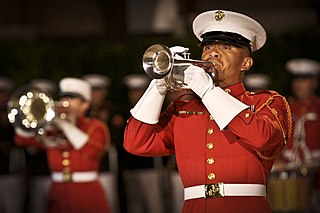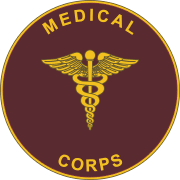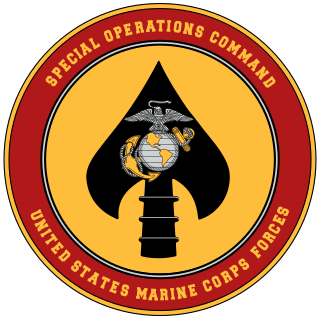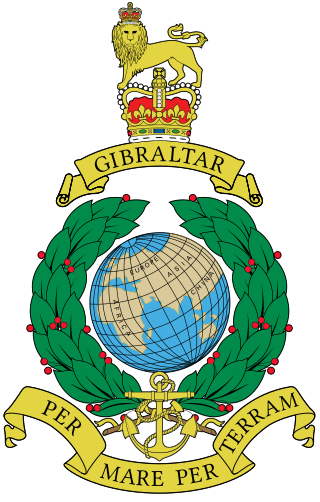
Military recruit training, commonly known as basic training or boot camp, refers to the initial instruction of new military personnel. It is a physically and psychologically intensive process, which resocializes its subjects for the unique demands of military employment.

A drill instructor is a non-commissioned officer in the armed forces, fire department, or police forces with specific duties that vary by country. Foot drill, military step, and marching are typically taught by drill instructors.
The School of Infantry (SOI) is the second stage of initial military training for enlisted United States Marines after recruit training. The ITB now called IMC went from a 59 day course to 14 week course. Since the initial training pipeline is divided between coasts, Marines from areas east of the Mississippi River usually graduate from MCRD Parris Island and move on to SOI at SOI East, while those from the western half of the nation attend MCRD San Diego and move on to SOI West at the Camp San Onofre area of Camp Pendleton in California. Female Marines are trained at both SOI East and SOI West. The School of Infantry's training mission ensures "Every Marine is, first and foremost, a Rifleman". At SOI, Marines with the Military Occupational Specialty of infantry are trained at the Infantry Training Battalion (ITB), while all non-infantry Marines are trained in basic infantry and combat skills at the Marine Combat Training Battalion. SOI marks a transition in the professional training of entry-level students from basically trained Marines to combat-ready Marines.

The Basic School (TBS) is where all newly commissioned and appointed United States Marine Corps officers are taught the basics of being an "Officer of Marines." The Basic School is located in Stafford County, Virginia to the south-west of the Marine Corps Base Quantico complex. Each year, over 1,700 new officers are trained, representing such commissioning sources as the U.S. Naval Academy, Navy ROTC, Officer Candidates School, and Marine Corps Limited Duty Officer (LDO) and Warrant Officer, U.S. Merchant Marine Academy accession programs.

The United States Marine Corps Silent Drill Platoon is a 24-man rifle platoon led by a Captain and Platoon Sergeant of the United States Marine Corps (USMC).

The United States Marine Drum & Bugle Corps is the drum and bugle corps of the United States Marine Corps. The D&B is now the only active duty drum and bugle corps in the United States Armed Forces. One of many United States military bands, the United States Marine Drum & Bugle Corps usually consists of about 70 active-duty Marines dressed in ceremonial red and white uniforms. The D&B performs martial and popular music.

Marine Barracks, Washington, D.C. is located at the corner of 8th and I streets, Southeast in Washington, D.C. Established in 1801, it is a National Historic Landmark, the oldest post in the United States Marine Corps, the official residence of the Commandant of the Marine Corps since 1806, and the main ceremonial grounds of the Corps. It is home to the U.S. Marine Drum and Bugle Corps and the U.S. Marine Band. Barracks Marines conduct ceremonial missions in and around the National Capital Region as well as abroad. They also provide security at designated locations around Washington, D.C. as necessary, and Barracks officers are part of the White House Social Aide Program.

The Medical Corps (MC) of the U.S. Army is a staff corps of the U.S. Army Medical Department (AMEDD) consisting of commissioned medical officers – physicians with either an M.D. or a D.O. degree, at least one year of post-graduate clinical training, and a state medical license.

Marine Corps University is a military education university system of the United States Marine Corps. It is part of the Naval University System and accredited by the Commission on Colleges of the Southern Association of Colleges and Schools to award Master's Degrees.
Education Facilitators, a privately held company in South Africa, was a holding and operating company in the education management industry that consisted of three trading divisions, one in professional services and two college brands that operated throughout southern and central Africa from its founding in 1994 to its closure in 2005.

United States Marine Forces Special Operations Command (MARSOC) is a component command of the United States Special Operations Command (SOCOM) that comprises the Marine Corps' contribution to SOCOM. Its core capabilities are direct action, special reconnaissance and foreign internal defense. MARSOC has also been directed to conduct counter-terrorism and information operations.

The Royal Marines Reserve (RMR) is the volunteer reserve force used to augment the regular Royal Marines. The RMR consists of some 600 trained ranks distributed among the four units within the UK. About 10 percent of the force are working with the Regular Corps on long-term attachments in all of the Royal Marines regular units. All the volunteers within the RMR must pass through the same rigorous commando course as the regulars. The former may be civilians with no previous military experience or may be former regular Royal Marines.
Public affairs is a term for the formal offices of the branches of the United States Department of Defense whose purpose is to deal with the media and community issues. The term is also used for numerous media relations offices that are created by the U.S. military for more specific limited purposes. Public affairs offices are staffed by a combination of officers, enlisted personnel, civilian officials and contract professionals.

United States Marine Corps Recruit Training is a 13-week program, including in & out-processing, of recruit training that each recruit must successfully complete in order to serve in the United States Marine Corps.

The Marine Corps Training and Education Command (TECOM) is the primary training command of the United States Marine Corps. TECOM leads the Marine Corps Training and Education continuum from individual entry-level training, professional military education and continuous professional development, through unit, collective, and service-level training in order to produce warfighters and enhance warfighting organizations that enable the Fleet Marine Force (FMF) to build and sustain the combat readiness required to fight and win today and in the future.

The Marine Corps Security Force Regiment is a dedicated security and anti-terrorism unit of the United States Marine Corps. It provides security forces to guard high-value naval installations, most notably those containing nuclear vessels and weapons. It also provides Fleet Anti-terrorism Security Teams (FAST) and Recapture Tactics Teams (RTT). Marines who complete Security Forces training are assigned a secondary Military Occupational Specialty (MOS) of 8152, while instructors can earn 8153.

All branches of the United States Armed Forces use the general term Enlisted Professional Military Education (EPME) to describe the formal system of education which each branch provides to its enlisted personnel. Each branch has its own system and sequence of courses, with the overall focus on leadership and management. Education generally increases in intensity and level of knowledge as individuals progress in rank and assume broader leadership roles. EPME is distinct from the technical training which service members receive for their Military Occupational Specialty (MOS), Air Force Specialty Code (AFSC), or Navy Rating.
A School of Infantry provides training in weapons and infantry tactics to infantrymen of a nation's military forces.

The Marine Corps Security Force Battalion Bangor (MCSFBn Bangor) is part of the Marine Corps Security Force Regiment. Its mission is to provide dedicated security support to Strategic Weapons Facility, Pacific (SWFPAC) operations.

The Friday Evening Parade is a public duty performed by the United States Marine Corps at Marine Barracks Washington. It is executed on Friday evenings during the summer months. The parade's drill is loosely based on the Landing Party Manual.
















